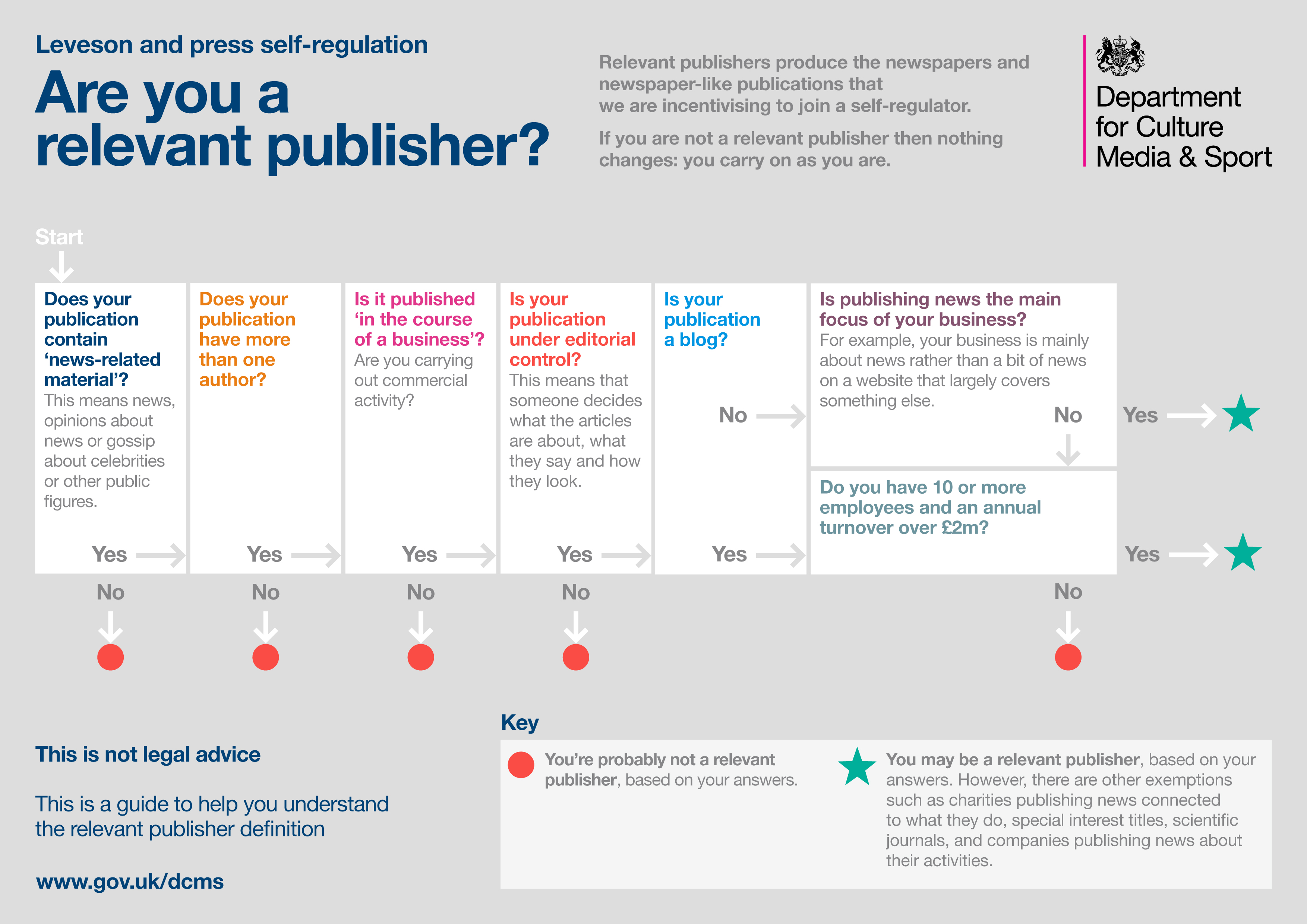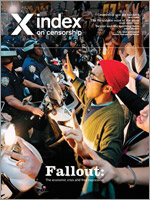22 Apr 2013 | Leveson Inquiry, Media Freedom, Newswire
The Department for Culture, Media and Sport has released this handy flowchart illustrating who will and who won’t be covered by the proposed new press/web regulator. Suffice to say, Index has one or two problems with it.

UPDATE: This, from the DCMS website, is also a little confusing:
Despite not falling under the definition of relevant publisher, any publication that is exempt as a micro-business as a result of these amendments could still choose to join a regulator and receive the legal benefits otherwise only available to relevant publishers in the regulator. That means protection from exemplary damages.
If you’re exempt as a “micro-business”, aren’t you supposed to be protected from exemplary damages anyway?
22 Apr 2013 | Leveson Inquiry
The Department for Culture, Media and Sport has released this handy flowchart illustrating who will and who won’t be covered by the proposed new press/web regulator. Suffice to say, Index has one or two problems with it.

UPDATE: This, from the DCMS website, is also a little confusing:
Despite not falling under the definition of relevant publisher, any publication that is exempt as a micro-business as a result of these amendments could still choose to join a regulator and receive the legal benefits otherwise only available to relevant publishers in the regulator. That means protection from exemplary damages.
If you’re exempt as a “micro-business”, aren’t you supposed to be protected from exemplary damages anyway?
26 Mar 2013 | Volume 42.01 Spring 2013

In our increasingly digital times, freedom of expression may look like one of the positive beneficiaries of our ever more interconnected world. Countries like China or Iran build firewalls and employ small armies of censors and snoopers in determined attempts to keep their bit of the internet controlled and uncritical of their ruling elites. But with social media, blogs, citizen journalism, and ever greater amounts of news on a diverse and expanding range of sites, information is shared across borders and goes around censors with greater ease than ever before.
Yet online and off, free speech still needs defending from those in power who would like to control information, limit criticism or snoop widely across people and populations. And it would be a mistake to think the free speech attackers are only the obvious bad guys like China, Iran or North Korea.
While Putin’s Russia jails members of Pussy Riot, passes new laws to block websites and journalists continue to face risks of violent attack, it is Turkey, in 2013, that has more journalists in jail than even Iran or China. In 2004, the European Union assessed Turkey as democratic enough to be a candidate for EU membership. Today, Turkey’s government puts pressure on media companies and editors to rein in critical journalists and self-censorship is rife.
Meanwhile, in the UK, a fully paid-up member of the democracy club, the government and opposition argue over whether Parliament should regulate the print media (“statutory underpinning”, to use the jargon introduced by the Leveson Report into the phone-hacking scandal). On 18 March, the UK’s three main political parties agreed on a new press regulation system whereby an independent regulator would be set up by royal charter. And in this debate over media standards and regulation, the most basic principle, that politicians should not in any way control the press (given their interests in positive, uncritical press coverage), has been too easily abandoned by many. Yet the press faces big questions: what has happened to its standards, how can individuals fairly complain? Similar debates are under way in India, with corruption and the phenomenon of ‘“paid news” among concerns there. Falling standards provide easy targets for those who would control press freedom for other reasons.
Plenty of governments of all shades are showing themselves only too ready to compromise on civil liberties in the face of the large amounts of easily accessible data our digital world produces. Shining a light on requests for information — as Google and Twitter do in their respective transparency reports — is one vital part of the campaigns and democraticdebate needed if the internet is not to become a partially censored, and highly monitored, world.
Google’s recent update of its figures for requests for user data by law enforcement agencies shows the US way ahead of other countries — accounting for over a third of requests with 8,438 demands, with India coming in at 2,431 and the UK, Germany and France not so far behind India.
Both India and the UK have also used too widely drawn laws that criminalise “grossly offensive” comments, leading to the arrest and prosecution of individuals for innocuous social media comments. Public outcry and ensuing debate in both countries is one sign that people will stand up for free speech. But such laws must change.
A new digital revolution is coming, as millions more people move online via their mobiles. As smart phone prices fall, and take-up expands, the opportunities for free expression and accessto information across borders are set to grow. But unless we are all vigilant, whether we face democratic or authoritarian regimes, in demanding our right to that free expression, our digital world risks being a partially censored, monitored and fragmented one. This is the global free speech challenge of our times.

20 Mar 2013 | Leveson Inquiry, Media Freedom, United Kingdom
Two days after the publication of the all-party agreed Royal Charter on “self-regulation” of the press, there’s seems no further clarity on some issues of enormous concern. Apart from the statute required to “underpin” the regulator itself, and the question of who and who isn’t a “relevant news publisher”, issues of exemplary damages, costs and apologies have alarmed many in the media and beyond.
On BBC News yesterday, Private Eye editor Ian Hislop outlined his concerns about the new press regulator. Hislop, whose publication was not part of the Press Complaints Commission, said he was concerned that publications outside the regulator (and the debate still rages over who is and isn’t supposed to be inside the regulator) would face not only exemplary damages, but also possibly have to pay the costs of any case even if they won.
Clause NC27A of the Crime and Courts bill, which sets out the costs regime does state that the defendant must pay costs in any case, unless the judge believes the case could not possibly have been settled by the regulator’s arbitration wing – i.e. if this would have ended up in court anyway.
This is quite definitely “Leveson Compliant”, (see par 67 and 68 of the Executive Summary of Lord Justice Leveson’s report and is essentially punitive. One wonders would it pass the test of a “fair and public hearing within a reasonable time by an independent and impartial tribunal established by law”, as laid out in article of the European Convention on Human Rights. It is extremely likely that a case following this procedure will end up in the European Court of Human Rights in Strasbourg. And quite rightly so. It’s bizarre, unjust and coercive.
There are also concerns about the proposed regulator’s power to “direct” the placement of apologies.
Again, this is “Leveson compliant” — the Lord Justice himself stated “The power to direct the nature, extent and placement of apologies should lie with the Board”.
This is also really problematic, suggesting as it does that a Quango can determine what is and isn’t published in newspapers, and where. This may seem angel-on-pinhead stuff, but there is a world of difference between “direct” and “require”. While apologies may be desirable, it’s simply not safe to give an external power with state underpinning the power to tell editors what to put in papers. Forced publication is a sinister perversion of free expression, and has no place in the British press or anywhere else.




